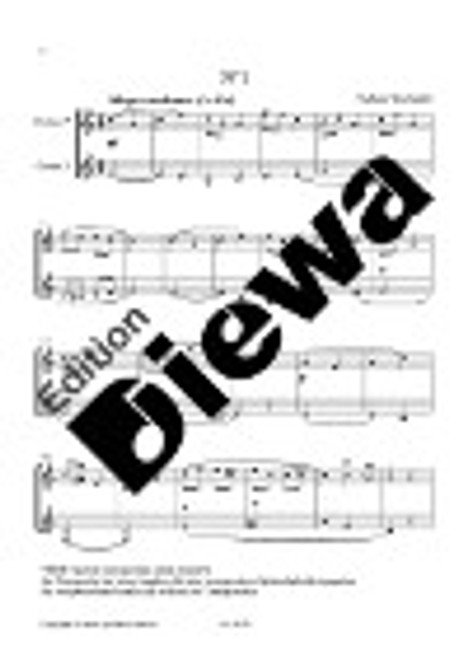Vecchietti, Vedasto (1842-1922) (Kritische Ausgabe Edoardo Pirozzi)
Dieci duetti per due corni a macchina op. 5 (1880)
für 2 Hörner
10 Duette für 2 Hörner
In 1881 Carlo Mannucci writes in his book L'arte a Roma following short
biography of Vedasto Vecchietti:
Within the masters of S. Cecilia, which are now part of the roman art,
because they were established in Rome, you should not forget Prof.
Vecchietti, teacher for brass instruments and first horn in the theatre
Apollo. The life of Vecchietti was adventurous.
Since childhood he was occupied with two studies: literature and music.
He was born in 1844, in Pollenza, near Macerata. Taking horn lessons until
age 16 and showing a high level of talent and potential.
In 1862, he played first horn in the orchestra of Athens. At that time when
he was just occupied with brass, he decided he could find himself a place in
art with that musical direction.
To this end he studied under master Bucchi in Tolentino, to refine his talent.
In 1865 he played in the theatre Argentina and in 1867 he was praised by
Rossini who had heard him play in Paris with the famous clarinet player
Liverani.
In 1869 he returned and settled in Rome, because the recently deceased
Lacovacci has appointed him to the theatre Apollo.
However he understood that to distinguish himself further it was important to
study the theory of harmony choosing the Cav. Cesare De Sanctis as his
teacher and with that he completed his education.
In 1877, after an excellent exam, he was nominated to the Liceo S. Cecilia as
a teacher of brass instruments.
Later on he wrote a "Valves Horn Method" for his students which has been used
by many schools of music including the Conservatory in Vienna.
Within a few years Vecchietti was held in high esteem in Rome as a
conscientious player and a diligent teacher.
He was funny and passionate about his work, art, and everything to do with
his position.
He had a good nature and was working with decency, virtues that must be
praised and that justify the name of a good master.
In 1881 Carlo Mannucci writes in his book L'arte a Roma following short
biography of Vedasto Vecchietti:
Within the masters of S. Cecilia, which are now part of the roman art,
because they were established in Rome, you should not forget Prof.
Vecchietti, teacher for brass instruments and first horn in the theatre
Apollo. The life of Vecchietti was adventurous.
Since childhood he was occupied with two studies: literature and music.
He was born in 1844, in Pollenza, near Macerata. Taking horn lessons until
age 16 and showing a high level of talent and potential.
In 1862, he played first horn in the orchestra of Athens. At that time when
he was just occupied with brass, he decided he could find himself a place in
art with that musical direction.
To this end he studied under master Bucchi in Tolentino, to refine his talent.
In 1865 he played in the theatre Argentina and in 1867 he was praised by
Rossini who had heard him play in Paris with the famous clarinet player
Liverani.
In 1869 he returned and settled in Rome, because the recently deceased
Lacovacci has appointed him to the theatre Apollo.
However he understood that to distinguish himself further it was important to
study the theory of harmony choosing the Cav. Cesare De Sanctis as his
teacher and with that he completed his education.
In 1877, after an excellent exam, he was nominated to the Liceo S. Cecilia as
a teacher of brass instruments.
Later on he wrote a "Valves Horn Method" for his students which has been used
by many schools of music including the Conservatory in Vienna.
Within a few years Vecchietti was held in high esteem in Rome as a
conscientious player and a diligent teacher.
He was funny and passionate about his work, art, and everything to do with
his position.
He had a good nature and was working with decency, virtues that must be
praised and that justify the name of a good master.



